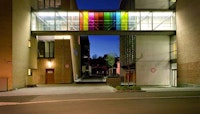It's wonderful to stand here again as Principal to officially open a new academic year!
Of course, the activity is already well underway: last week, we welcomed new students, and the building filled with increasing sound. Now, most of the students, teachers, and colleagues are here.
You are a hand-picked group: the new bachelor students who just performed for us, the new master's students, those beginning their doctoral journey next week, and our latest and long-standing colleagues, who are exceptionally skilled.
Welcome to everyone here today!





